Analysis of Company Law Case: Asden Developments Pty Ltd v Dinoris
VerifiedAdded on 2019/10/31
|8
|2408
|319
Case Study
AI Summary
This case study analyzes the case of Asden Developments Pty Ltd (in liq) v Dinoris (No 3) [2016] FCA 788, focusing on the duties of liquidators and directors under the Australian Corporations Act. The analysis explores the breach of statutory duties, specifically concerning the liquidator's conduct and good faith obligations. The case examines whether the liquidator's actions caused loss to the company, considering sections 180, 181, and 588G of the Corporations Act. The study also references related cases like Viscariello v Macks [2017] SASFC 172 and FODARE PTY LTD SHEARN (2011) NSWSC 479, highlighting the importance of acting in the best interests of the company and the consequences of breaching fiduciary duties. The analysis covers the application of the business judgment rule, the test of causation, and the responsibilities of directors in managing company funds. The case underscores the significance of prudence, care, and diligence in fulfilling legal obligations within the context of corporate law.
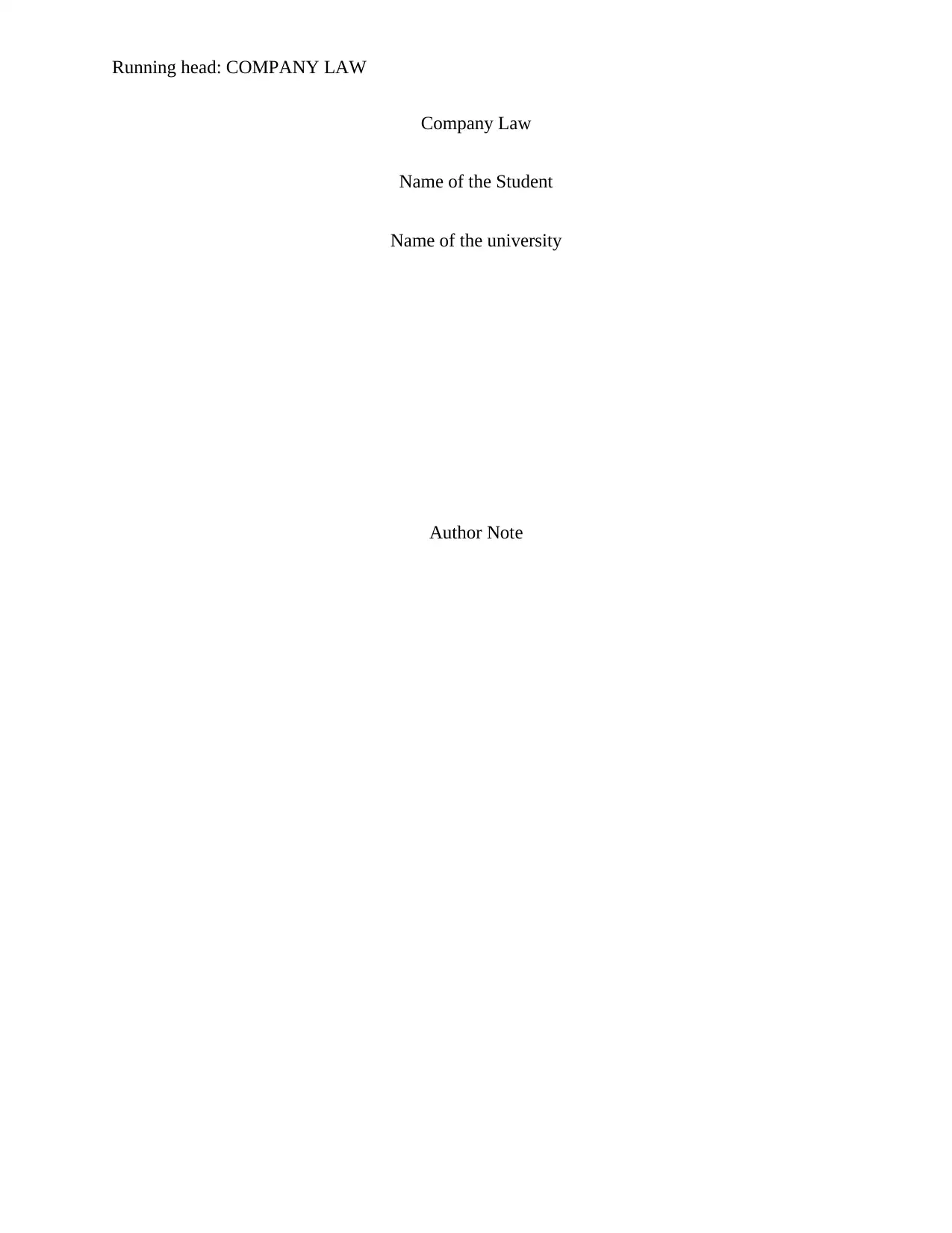
Running head: COMPANY LAW
Company Law
Name of the Student
Name of the university
Author Note
Company Law
Name of the Student
Name of the university
Author Note
Paraphrase This Document
Need a fresh take? Get an instant paraphrase of this document with our AI Paraphraser
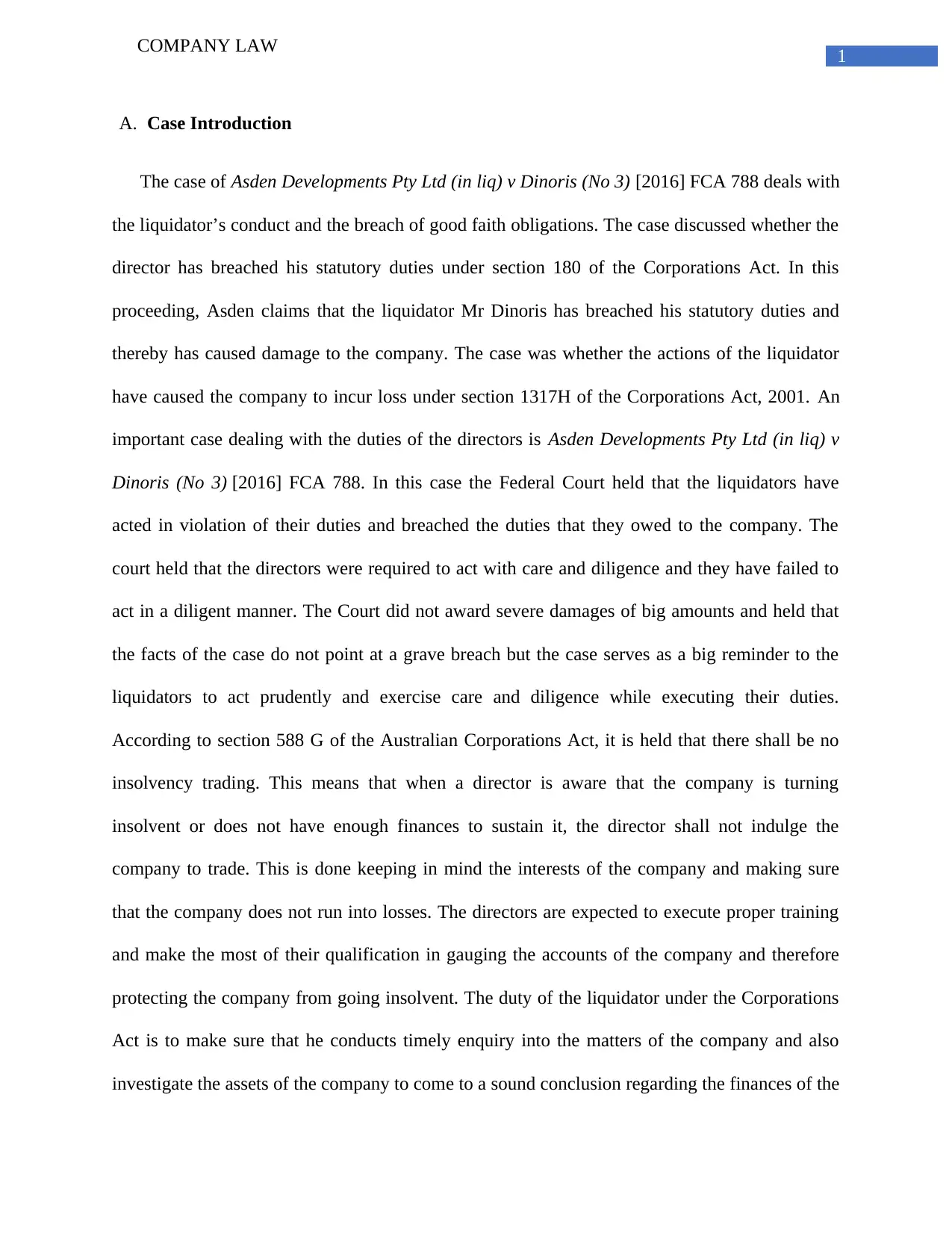
1
COMPANY LAW
A. Case Introduction
The case of Asden Developments Pty Ltd (in liq) v Dinoris (No 3) [2016] FCA 788 deals with
the liquidator’s conduct and the breach of good faith obligations. The case discussed whether the
director has breached his statutory duties under section 180 of the Corporations Act. In this
proceeding, Asden claims that the liquidator Mr Dinoris has breached his statutory duties and
thereby has caused damage to the company. The case was whether the actions of the liquidator
have caused the company to incur loss under section 1317H of the Corporations Act, 2001. An
important case dealing with the duties of the directors is Asden Developments Pty Ltd (in liq) v
Dinoris (No 3) [2016] FCA 788. In this case the Federal Court held that the liquidators have
acted in violation of their duties and breached the duties that they owed to the company. The
court held that the directors were required to act with care and diligence and they have failed to
act in a diligent manner. The Court did not award severe damages of big amounts and held that
the facts of the case do not point at a grave breach but the case serves as a big reminder to the
liquidators to act prudently and exercise care and diligence while executing their duties.
According to section 588 G of the Australian Corporations Act, it is held that there shall be no
insolvency trading. This means that when a director is aware that the company is turning
insolvent or does not have enough finances to sustain it, the director shall not indulge the
company to trade. This is done keeping in mind the interests of the company and making sure
that the company does not run into losses. The directors are expected to execute proper training
and make the most of their qualification in gauging the accounts of the company and therefore
protecting the company from going insolvent. The duty of the liquidator under the Corporations
Act is to make sure that he conducts timely enquiry into the matters of the company and also
investigate the assets of the company to come to a sound conclusion regarding the finances of the
COMPANY LAW
A. Case Introduction
The case of Asden Developments Pty Ltd (in liq) v Dinoris (No 3) [2016] FCA 788 deals with
the liquidator’s conduct and the breach of good faith obligations. The case discussed whether the
director has breached his statutory duties under section 180 of the Corporations Act. In this
proceeding, Asden claims that the liquidator Mr Dinoris has breached his statutory duties and
thereby has caused damage to the company. The case was whether the actions of the liquidator
have caused the company to incur loss under section 1317H of the Corporations Act, 2001. An
important case dealing with the duties of the directors is Asden Developments Pty Ltd (in liq) v
Dinoris (No 3) [2016] FCA 788. In this case the Federal Court held that the liquidators have
acted in violation of their duties and breached the duties that they owed to the company. The
court held that the directors were required to act with care and diligence and they have failed to
act in a diligent manner. The Court did not award severe damages of big amounts and held that
the facts of the case do not point at a grave breach but the case serves as a big reminder to the
liquidators to act prudently and exercise care and diligence while executing their duties.
According to section 588 G of the Australian Corporations Act, it is held that there shall be no
insolvency trading. This means that when a director is aware that the company is turning
insolvent or does not have enough finances to sustain it, the director shall not indulge the
company to trade. This is done keeping in mind the interests of the company and making sure
that the company does not run into losses. The directors are expected to execute proper training
and make the most of their qualification in gauging the accounts of the company and therefore
protecting the company from going insolvent. The duty of the liquidator under the Corporations
Act is to make sure that he conducts timely enquiry into the matters of the company and also
investigate the assets of the company to come to a sound conclusion regarding the finances of the
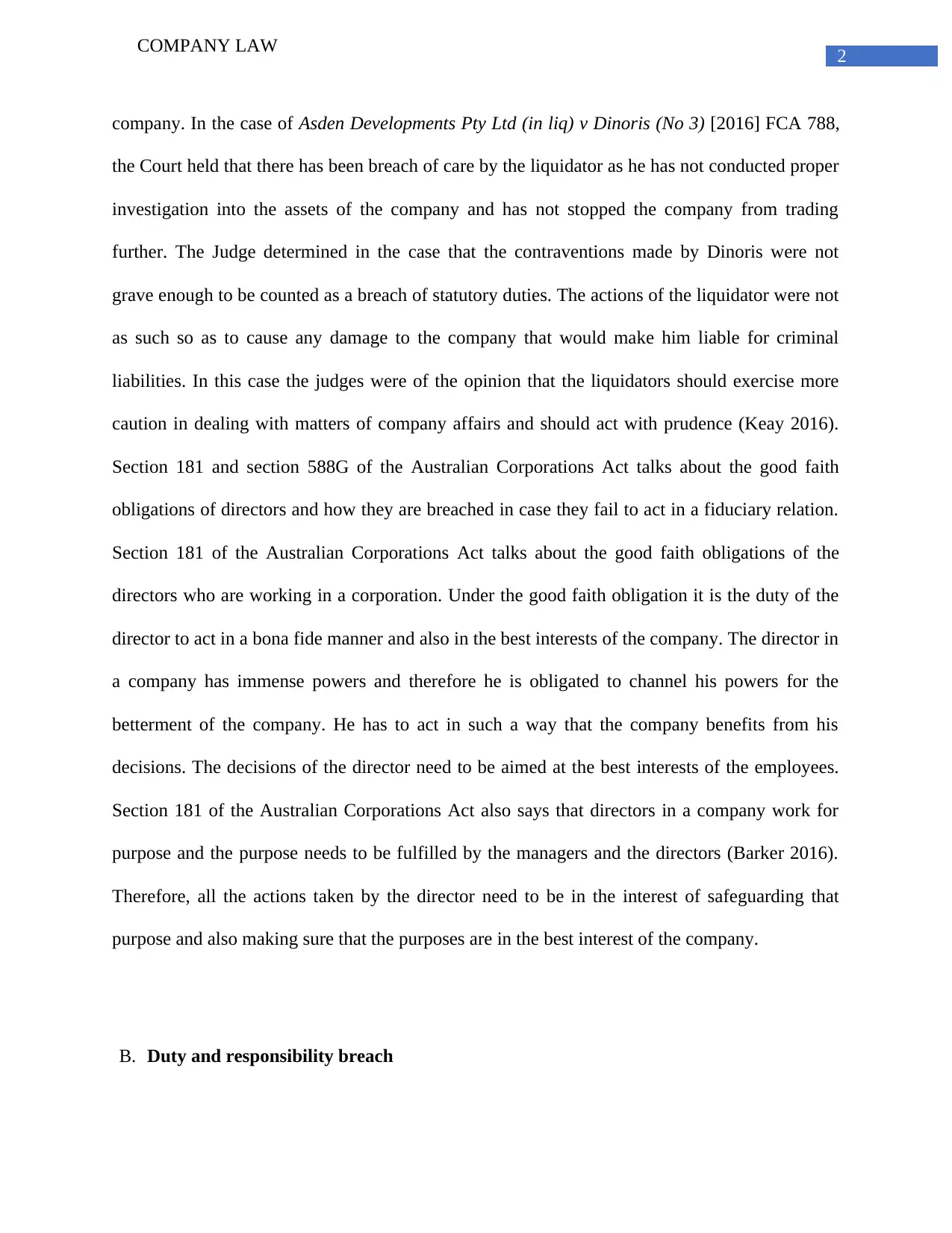
2
COMPANY LAW
company. In the case of Asden Developments Pty Ltd (in liq) v Dinoris (No 3) [2016] FCA 788,
the Court held that there has been breach of care by the liquidator as he has not conducted proper
investigation into the assets of the company and has not stopped the company from trading
further. The Judge determined in the case that the contraventions made by Dinoris were not
grave enough to be counted as a breach of statutory duties. The actions of the liquidator were not
as such so as to cause any damage to the company that would make him liable for criminal
liabilities. In this case the judges were of the opinion that the liquidators should exercise more
caution in dealing with matters of company affairs and should act with prudence (Keay 2016).
Section 181 and section 588G of the Australian Corporations Act talks about the good faith
obligations of directors and how they are breached in case they fail to act in a fiduciary relation.
Section 181 of the Australian Corporations Act talks about the good faith obligations of the
directors who are working in a corporation. Under the good faith obligation it is the duty of the
director to act in a bona fide manner and also in the best interests of the company. The director in
a company has immense powers and therefore he is obligated to channel his powers for the
betterment of the company. He has to act in such a way that the company benefits from his
decisions. The decisions of the director need to be aimed at the best interests of the employees.
Section 181 of the Australian Corporations Act also says that directors in a company work for
purpose and the purpose needs to be fulfilled by the managers and the directors (Barker 2016).
Therefore, all the actions taken by the director need to be in the interest of safeguarding that
purpose and also making sure that the purposes are in the best interest of the company.
B. Duty and responsibility breach
COMPANY LAW
company. In the case of Asden Developments Pty Ltd (in liq) v Dinoris (No 3) [2016] FCA 788,
the Court held that there has been breach of care by the liquidator as he has not conducted proper
investigation into the assets of the company and has not stopped the company from trading
further. The Judge determined in the case that the contraventions made by Dinoris were not
grave enough to be counted as a breach of statutory duties. The actions of the liquidator were not
as such so as to cause any damage to the company that would make him liable for criminal
liabilities. In this case the judges were of the opinion that the liquidators should exercise more
caution in dealing with matters of company affairs and should act with prudence (Keay 2016).
Section 181 and section 588G of the Australian Corporations Act talks about the good faith
obligations of directors and how they are breached in case they fail to act in a fiduciary relation.
Section 181 of the Australian Corporations Act talks about the good faith obligations of the
directors who are working in a corporation. Under the good faith obligation it is the duty of the
director to act in a bona fide manner and also in the best interests of the company. The director in
a company has immense powers and therefore he is obligated to channel his powers for the
betterment of the company. He has to act in such a way that the company benefits from his
decisions. The decisions of the director need to be aimed at the best interests of the employees.
Section 181 of the Australian Corporations Act also says that directors in a company work for
purpose and the purpose needs to be fulfilled by the managers and the directors (Barker 2016).
Therefore, all the actions taken by the director need to be in the interest of safeguarding that
purpose and also making sure that the purposes are in the best interest of the company.
B. Duty and responsibility breach
⊘ This is a preview!⊘
Do you want full access?
Subscribe today to unlock all pages.

Trusted by 1+ million students worldwide
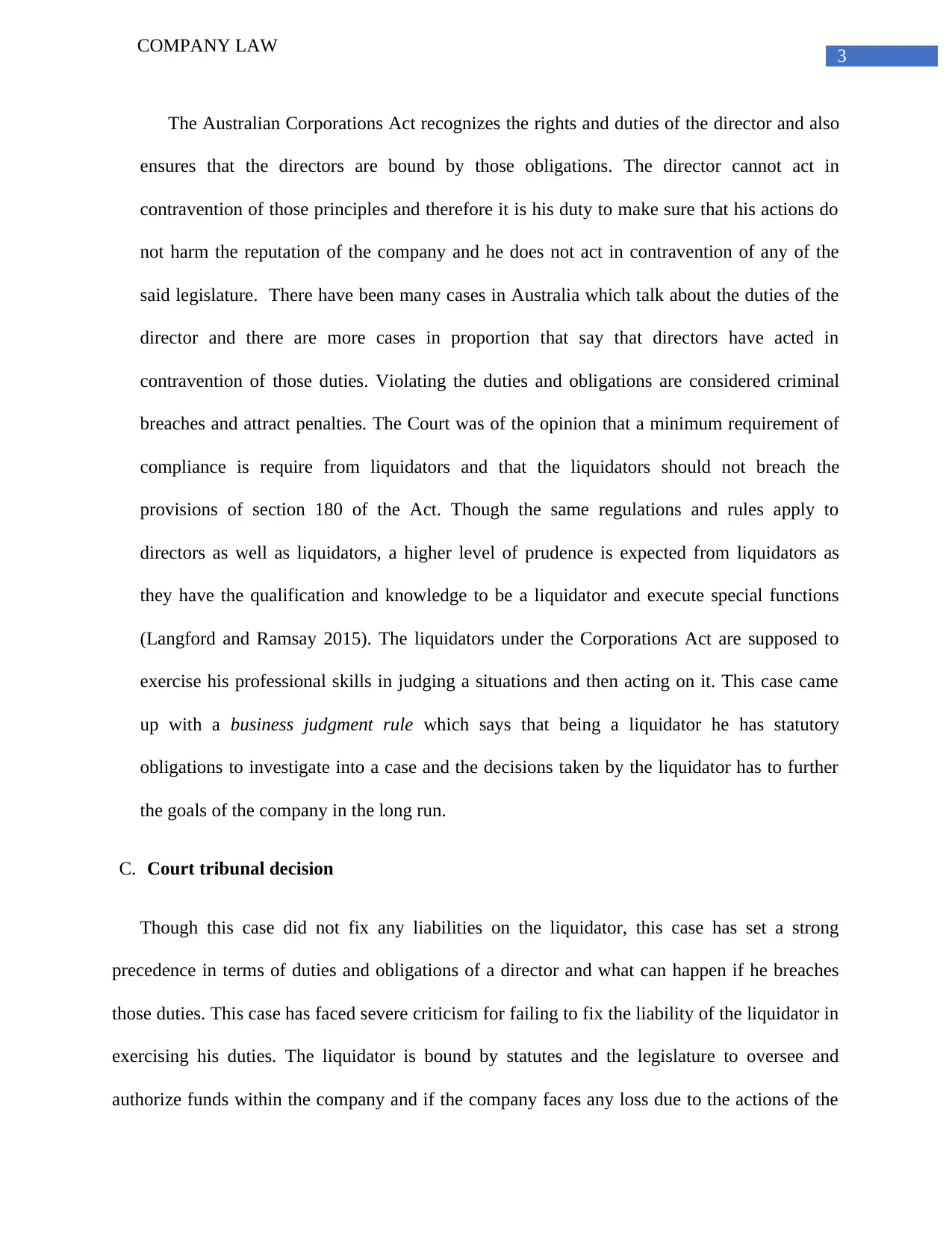
3
COMPANY LAW
The Australian Corporations Act recognizes the rights and duties of the director and also
ensures that the directors are bound by those obligations. The director cannot act in
contravention of those principles and therefore it is his duty to make sure that his actions do
not harm the reputation of the company and he does not act in contravention of any of the
said legislature. There have been many cases in Australia which talk about the duties of the
director and there are more cases in proportion that say that directors have acted in
contravention of those duties. Violating the duties and obligations are considered criminal
breaches and attract penalties. The Court was of the opinion that a minimum requirement of
compliance is require from liquidators and that the liquidators should not breach the
provisions of section 180 of the Act. Though the same regulations and rules apply to
directors as well as liquidators, a higher level of prudence is expected from liquidators as
they have the qualification and knowledge to be a liquidator and execute special functions
(Langford and Ramsay 2015). The liquidators under the Corporations Act are supposed to
exercise his professional skills in judging a situations and then acting on it. This case came
up with a business judgment rule which says that being a liquidator he has statutory
obligations to investigate into a case and the decisions taken by the liquidator has to further
the goals of the company in the long run.
C. Court tribunal decision
Though this case did not fix any liabilities on the liquidator, this case has set a strong
precedence in terms of duties and obligations of a director and what can happen if he breaches
those duties. This case has faced severe criticism for failing to fix the liability of the liquidator in
exercising his duties. The liquidator is bound by statutes and the legislature to oversee and
authorize funds within the company and if the company faces any loss due to the actions of the
COMPANY LAW
The Australian Corporations Act recognizes the rights and duties of the director and also
ensures that the directors are bound by those obligations. The director cannot act in
contravention of those principles and therefore it is his duty to make sure that his actions do
not harm the reputation of the company and he does not act in contravention of any of the
said legislature. There have been many cases in Australia which talk about the duties of the
director and there are more cases in proportion that say that directors have acted in
contravention of those duties. Violating the duties and obligations are considered criminal
breaches and attract penalties. The Court was of the opinion that a minimum requirement of
compliance is require from liquidators and that the liquidators should not breach the
provisions of section 180 of the Act. Though the same regulations and rules apply to
directors as well as liquidators, a higher level of prudence is expected from liquidators as
they have the qualification and knowledge to be a liquidator and execute special functions
(Langford and Ramsay 2015). The liquidators under the Corporations Act are supposed to
exercise his professional skills in judging a situations and then acting on it. This case came
up with a business judgment rule which says that being a liquidator he has statutory
obligations to investigate into a case and the decisions taken by the liquidator has to further
the goals of the company in the long run.
C. Court tribunal decision
Though this case did not fix any liabilities on the liquidator, this case has set a strong
precedence in terms of duties and obligations of a director and what can happen if he breaches
those duties. This case has faced severe criticism for failing to fix the liability of the liquidator in
exercising his duties. The liquidator is bound by statutes and the legislature to oversee and
authorize funds within the company and if the company faces any loss due to the actions of the
Paraphrase This Document
Need a fresh take? Get an instant paraphrase of this document with our AI Paraphraser
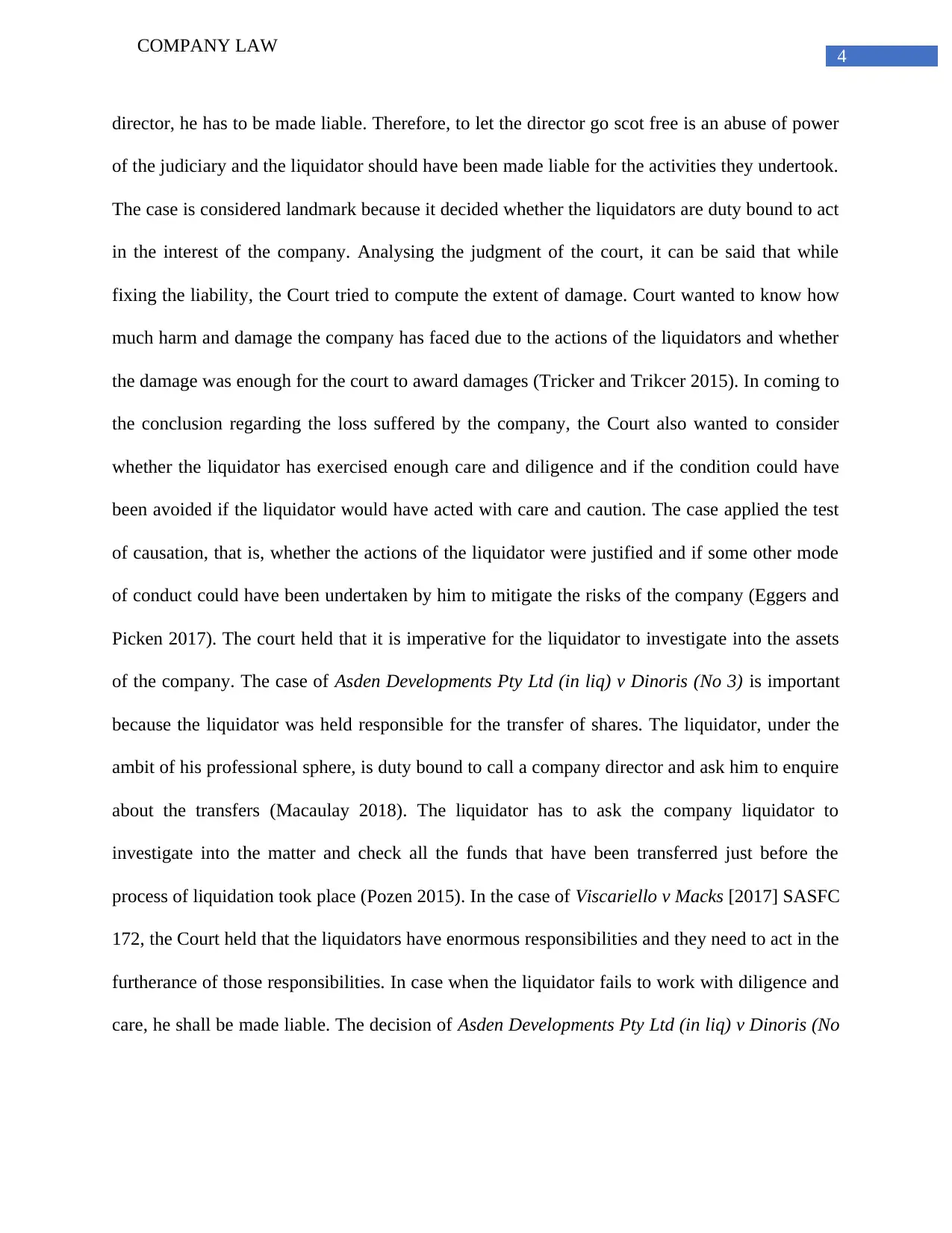
4
COMPANY LAW
director, he has to be made liable. Therefore, to let the director go scot free is an abuse of power
of the judiciary and the liquidator should have been made liable for the activities they undertook.
The case is considered landmark because it decided whether the liquidators are duty bound to act
in the interest of the company. Analysing the judgment of the court, it can be said that while
fixing the liability, the Court tried to compute the extent of damage. Court wanted to know how
much harm and damage the company has faced due to the actions of the liquidators and whether
the damage was enough for the court to award damages (Tricker and Trikcer 2015). In coming to
the conclusion regarding the loss suffered by the company, the Court also wanted to consider
whether the liquidator has exercised enough care and diligence and if the condition could have
been avoided if the liquidator would have acted with care and caution. The case applied the test
of causation, that is, whether the actions of the liquidator were justified and if some other mode
of conduct could have been undertaken by him to mitigate the risks of the company (Eggers and
Picken 2017). The court held that it is imperative for the liquidator to investigate into the assets
of the company. The case of Asden Developments Pty Ltd (in liq) v Dinoris (No 3) is important
because the liquidator was held responsible for the transfer of shares. The liquidator, under the
ambit of his professional sphere, is duty bound to call a company director and ask him to enquire
about the transfers (Macaulay 2018). The liquidator has to ask the company liquidator to
investigate into the matter and check all the funds that have been transferred just before the
process of liquidation took place (Pozen 2015). In the case of Viscariello v Macks [2017] SASFC
172, the Court held that the liquidators have enormous responsibilities and they need to act in the
furtherance of those responsibilities. In case when the liquidator fails to work with diligence and
care, he shall be made liable. The decision of Asden Developments Pty Ltd (in liq) v Dinoris (No
COMPANY LAW
director, he has to be made liable. Therefore, to let the director go scot free is an abuse of power
of the judiciary and the liquidator should have been made liable for the activities they undertook.
The case is considered landmark because it decided whether the liquidators are duty bound to act
in the interest of the company. Analysing the judgment of the court, it can be said that while
fixing the liability, the Court tried to compute the extent of damage. Court wanted to know how
much harm and damage the company has faced due to the actions of the liquidators and whether
the damage was enough for the court to award damages (Tricker and Trikcer 2015). In coming to
the conclusion regarding the loss suffered by the company, the Court also wanted to consider
whether the liquidator has exercised enough care and diligence and if the condition could have
been avoided if the liquidator would have acted with care and caution. The case applied the test
of causation, that is, whether the actions of the liquidator were justified and if some other mode
of conduct could have been undertaken by him to mitigate the risks of the company (Eggers and
Picken 2017). The court held that it is imperative for the liquidator to investigate into the assets
of the company. The case of Asden Developments Pty Ltd (in liq) v Dinoris (No 3) is important
because the liquidator was held responsible for the transfer of shares. The liquidator, under the
ambit of his professional sphere, is duty bound to call a company director and ask him to enquire
about the transfers (Macaulay 2018). The liquidator has to ask the company liquidator to
investigate into the matter and check all the funds that have been transferred just before the
process of liquidation took place (Pozen 2015). In the case of Viscariello v Macks [2017] SASFC
172, the Court held that the liquidators have enormous responsibilities and they need to act in the
furtherance of those responsibilities. In case when the liquidator fails to work with diligence and
care, he shall be made liable. The decision of Asden Developments Pty Ltd (in liq) v Dinoris (No
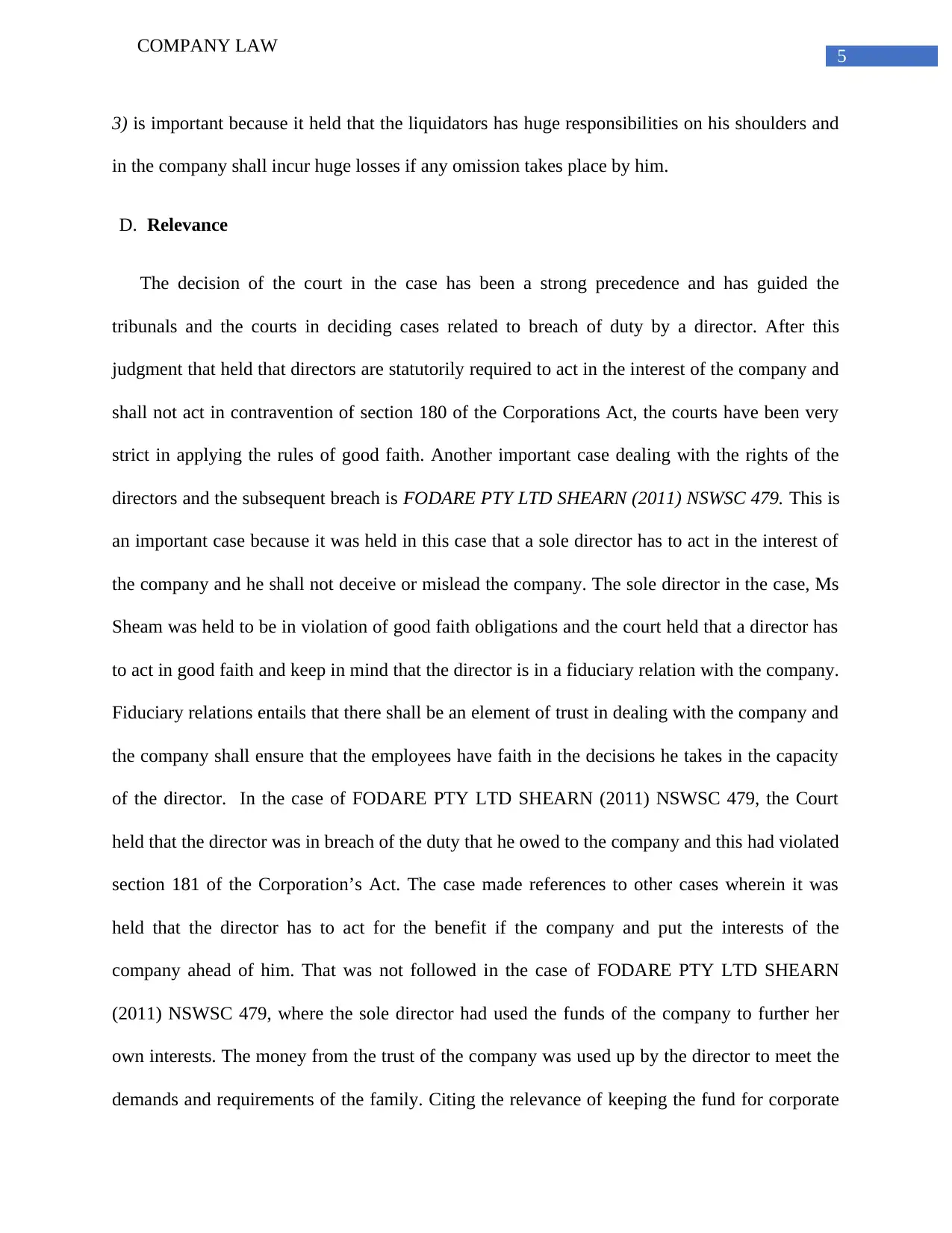
5
COMPANY LAW
3) is important because it held that the liquidators has huge responsibilities on his shoulders and
in the company shall incur huge losses if any omission takes place by him.
D. Relevance
The decision of the court in the case has been a strong precedence and has guided the
tribunals and the courts in deciding cases related to breach of duty by a director. After this
judgment that held that directors are statutorily required to act in the interest of the company and
shall not act in contravention of section 180 of the Corporations Act, the courts have been very
strict in applying the rules of good faith. Another important case dealing with the rights of the
directors and the subsequent breach is FODARE PTY LTD SHEARN (2011) NSWSC 479. This is
an important case because it was held in this case that a sole director has to act in the interest of
the company and he shall not deceive or mislead the company. The sole director in the case, Ms
Sheam was held to be in violation of good faith obligations and the court held that a director has
to act in good faith and keep in mind that the director is in a fiduciary relation with the company.
Fiduciary relations entails that there shall be an element of trust in dealing with the company and
the company shall ensure that the employees have faith in the decisions he takes in the capacity
of the director. In the case of FODARE PTY LTD SHEARN (2011) NSWSC 479, the Court
held that the director was in breach of the duty that he owed to the company and this had violated
section 181 of the Corporation’s Act. The case made references to other cases wherein it was
held that the director has to act for the benefit if the company and put the interests of the
company ahead of him. That was not followed in the case of FODARE PTY LTD SHEARN
(2011) NSWSC 479, where the sole director had used the funds of the company to further her
own interests. The money from the trust of the company was used up by the director to meet the
demands and requirements of the family. Citing the relevance of keeping the fund for corporate
COMPANY LAW
3) is important because it held that the liquidators has huge responsibilities on his shoulders and
in the company shall incur huge losses if any omission takes place by him.
D. Relevance
The decision of the court in the case has been a strong precedence and has guided the
tribunals and the courts in deciding cases related to breach of duty by a director. After this
judgment that held that directors are statutorily required to act in the interest of the company and
shall not act in contravention of section 180 of the Corporations Act, the courts have been very
strict in applying the rules of good faith. Another important case dealing with the rights of the
directors and the subsequent breach is FODARE PTY LTD SHEARN (2011) NSWSC 479. This is
an important case because it was held in this case that a sole director has to act in the interest of
the company and he shall not deceive or mislead the company. The sole director in the case, Ms
Sheam was held to be in violation of good faith obligations and the court held that a director has
to act in good faith and keep in mind that the director is in a fiduciary relation with the company.
Fiduciary relations entails that there shall be an element of trust in dealing with the company and
the company shall ensure that the employees have faith in the decisions he takes in the capacity
of the director. In the case of FODARE PTY LTD SHEARN (2011) NSWSC 479, the Court
held that the director was in breach of the duty that he owed to the company and this had violated
section 181 of the Corporation’s Act. The case made references to other cases wherein it was
held that the director has to act for the benefit if the company and put the interests of the
company ahead of him. That was not followed in the case of FODARE PTY LTD SHEARN
(2011) NSWSC 479, where the sole director had used the funds of the company to further her
own interests. The money from the trust of the company was used up by the director to meet the
demands and requirements of the family. Citing the relevance of keeping the fund for corporate
⊘ This is a preview!⊘
Do you want full access?
Subscribe today to unlock all pages.

Trusted by 1+ million students worldwide
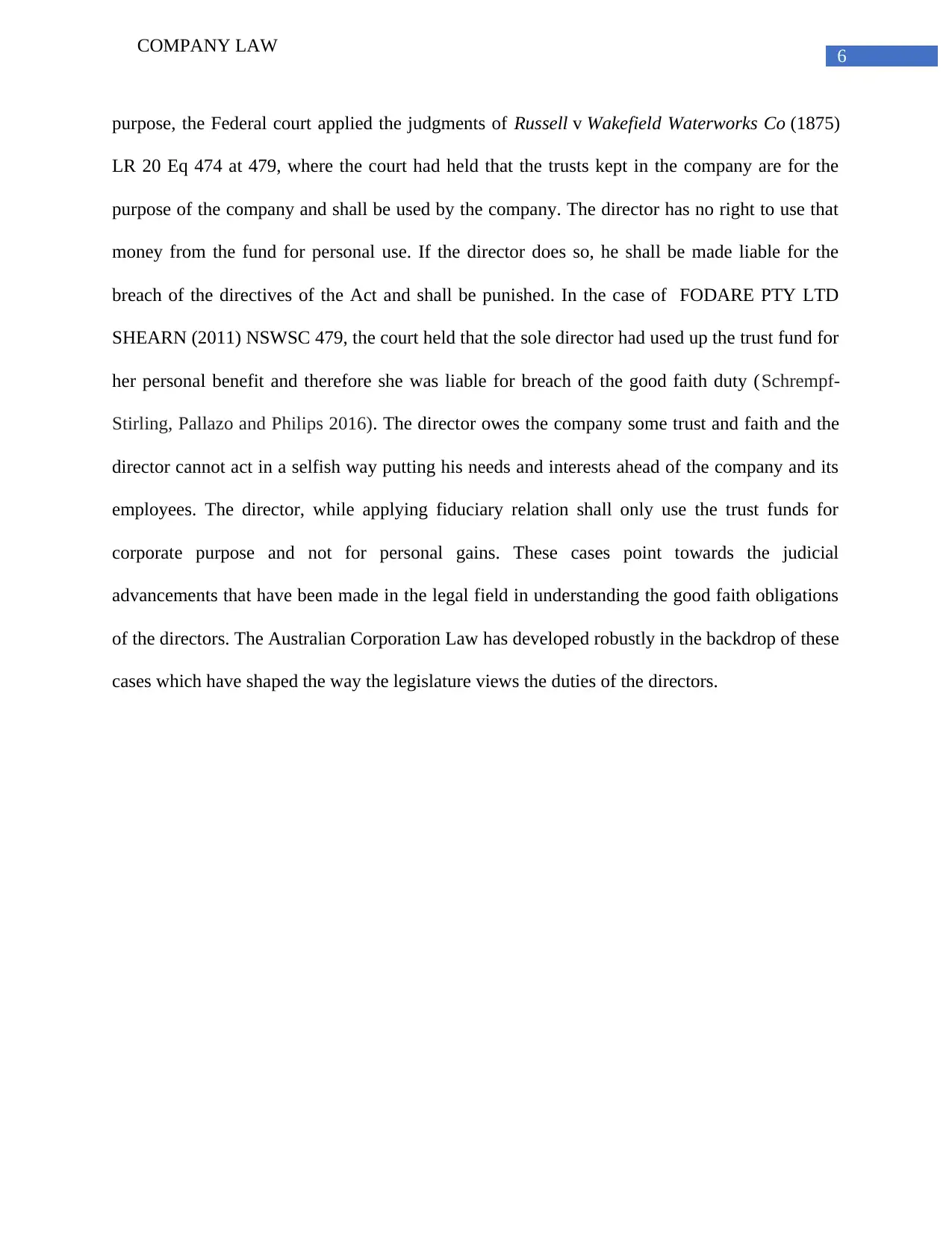
6
COMPANY LAW
purpose, the Federal court applied the judgments of Russell v Wakefield Waterworks Co (1875)
LR 20 Eq 474 at 479, where the court had held that the trusts kept in the company are for the
purpose of the company and shall be used by the company. The director has no right to use that
money from the fund for personal use. If the director does so, he shall be made liable for the
breach of the directives of the Act and shall be punished. In the case of FODARE PTY LTD
SHEARN (2011) NSWSC 479, the court held that the sole director had used up the trust fund for
her personal benefit and therefore she was liable for breach of the good faith duty (Schrempf-
Stirling, Pallazo and Philips 2016). The director owes the company some trust and faith and the
director cannot act in a selfish way putting his needs and interests ahead of the company and its
employees. The director, while applying fiduciary relation shall only use the trust funds for
corporate purpose and not for personal gains. These cases point towards the judicial
advancements that have been made in the legal field in understanding the good faith obligations
of the directors. The Australian Corporation Law has developed robustly in the backdrop of these
cases which have shaped the way the legislature views the duties of the directors.
COMPANY LAW
purpose, the Federal court applied the judgments of Russell v Wakefield Waterworks Co (1875)
LR 20 Eq 474 at 479, where the court had held that the trusts kept in the company are for the
purpose of the company and shall be used by the company. The director has no right to use that
money from the fund for personal use. If the director does so, he shall be made liable for the
breach of the directives of the Act and shall be punished. In the case of FODARE PTY LTD
SHEARN (2011) NSWSC 479, the court held that the sole director had used up the trust fund for
her personal benefit and therefore she was liable for breach of the good faith duty (Schrempf-
Stirling, Pallazo and Philips 2016). The director owes the company some trust and faith and the
director cannot act in a selfish way putting his needs and interests ahead of the company and its
employees. The director, while applying fiduciary relation shall only use the trust funds for
corporate purpose and not for personal gains. These cases point towards the judicial
advancements that have been made in the legal field in understanding the good faith obligations
of the directors. The Australian Corporation Law has developed robustly in the backdrop of these
cases which have shaped the way the legislature views the duties of the directors.
Paraphrase This Document
Need a fresh take? Get an instant paraphrase of this document with our AI Paraphraser
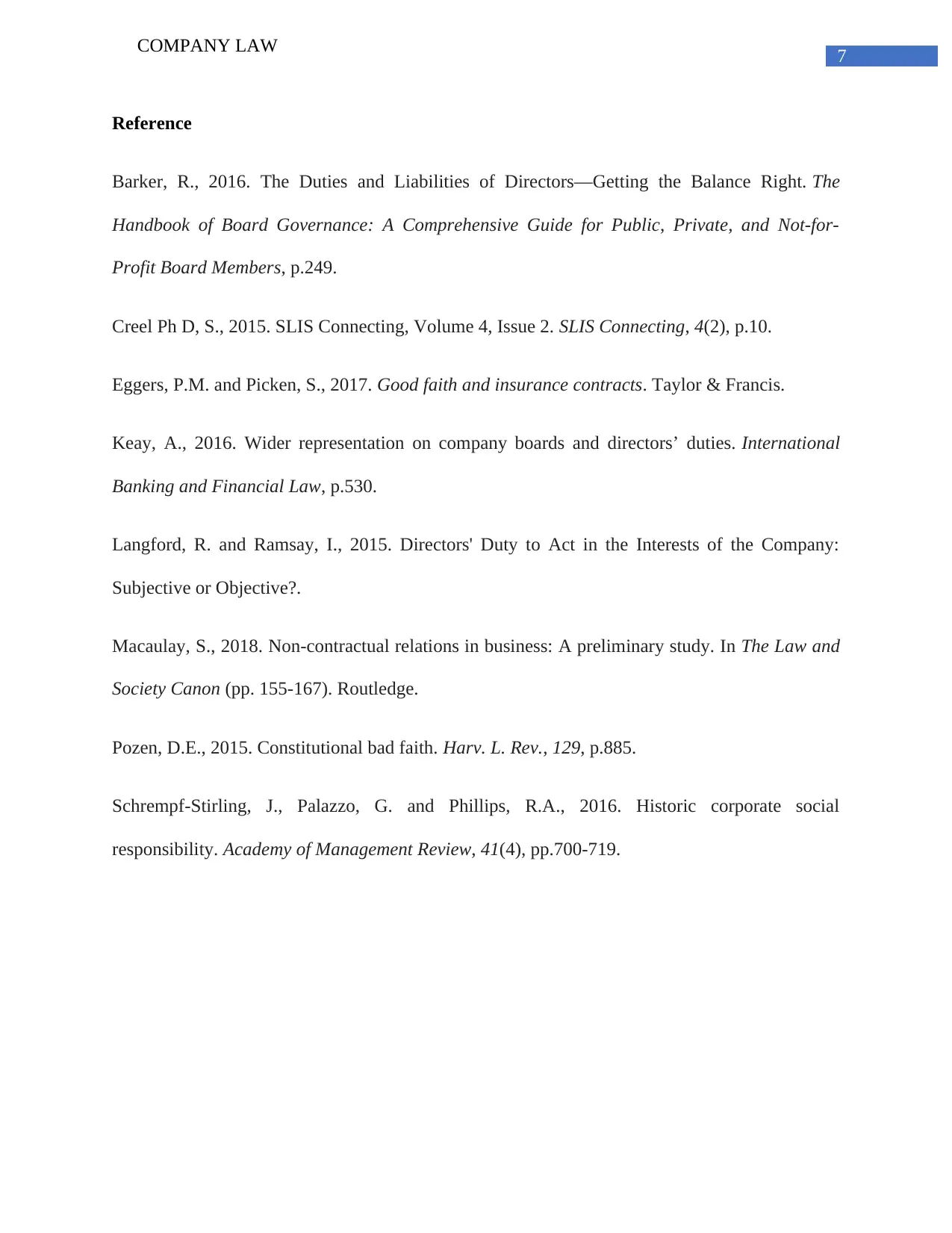
7
COMPANY LAW
Reference
Barker, R., 2016. The Duties and Liabilities of Directors—Getting the Balance Right. The
Handbook of Board Governance: A Comprehensive Guide for Public, Private, and Not-for-
Profit Board Members, p.249.
Creel Ph D, S., 2015. SLIS Connecting, Volume 4, Issue 2. SLIS Connecting, 4(2), p.10.
Eggers, P.M. and Picken, S., 2017. Good faith and insurance contracts. Taylor & Francis.
Keay, A., 2016. Wider representation on company boards and directors’ duties. International
Banking and Financial Law, p.530.
Langford, R. and Ramsay, I., 2015. Directors' Duty to Act in the Interests of the Company:
Subjective or Objective?.
Macaulay, S., 2018. Non-contractual relations in business: A preliminary study. In The Law and
Society Canon (pp. 155-167). Routledge.
Pozen, D.E., 2015. Constitutional bad faith. Harv. L. Rev., 129, p.885.
Schrempf-Stirling, J., Palazzo, G. and Phillips, R.A., 2016. Historic corporate social
responsibility. Academy of Management Review, 41(4), pp.700-719.
COMPANY LAW
Reference
Barker, R., 2016. The Duties and Liabilities of Directors—Getting the Balance Right. The
Handbook of Board Governance: A Comprehensive Guide for Public, Private, and Not-for-
Profit Board Members, p.249.
Creel Ph D, S., 2015. SLIS Connecting, Volume 4, Issue 2. SLIS Connecting, 4(2), p.10.
Eggers, P.M. and Picken, S., 2017. Good faith and insurance contracts. Taylor & Francis.
Keay, A., 2016. Wider representation on company boards and directors’ duties. International
Banking and Financial Law, p.530.
Langford, R. and Ramsay, I., 2015. Directors' Duty to Act in the Interests of the Company:
Subjective or Objective?.
Macaulay, S., 2018. Non-contractual relations in business: A preliminary study. In The Law and
Society Canon (pp. 155-167). Routledge.
Pozen, D.E., 2015. Constitutional bad faith. Harv. L. Rev., 129, p.885.
Schrempf-Stirling, J., Palazzo, G. and Phillips, R.A., 2016. Historic corporate social
responsibility. Academy of Management Review, 41(4), pp.700-719.
1 out of 8
Related Documents
Your All-in-One AI-Powered Toolkit for Academic Success.
+13062052269
info@desklib.com
Available 24*7 on WhatsApp / Email
![[object Object]](/_next/static/media/star-bottom.7253800d.svg)
Unlock your academic potential
Copyright © 2020–2026 A2Z Services. All Rights Reserved. Developed and managed by ZUCOL.


![Analysis of Asden Developments Pty Ltd v Dinoris (No 3) [2016] FCA 788](/_next/image/?url=https%3A%2F%2Fdesklib.com%2Fmedia%2Fliquidator-breach-of-duties_page_2.jpg&w=256&q=75)


